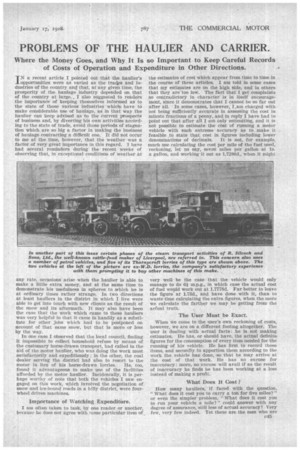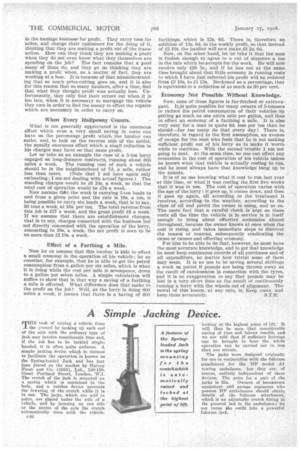PROBLEMS OF THE HAULIER AND CARRIER.
Page 67

Page 68

If you've noticed an error in this article please click here to report it so we can fix it.
Where the Money Goes, and Why. It Is so Important to Keep Careful Records of Costs of Operation and Expenditure in Other Directions.
IN a recent article I pointed out that the haulier's opportunities were as varied as the trades and industries of the country and that, at any given time, the prosperity of the haulage industry depended on that of the country at large.. I also suggested to readers the importance of keeping themselves informed as to the state of those various industries which have to make considerable use of haulage, as in that way the haulier can keep advised as to the current prospects of business and, by diverting his own activities according to the state of trade, aVoicl those periods of stagnation which are so big a factor in making the business of haulage contracting a difficult one. It did not occur to me at the time, however, that the weather was a factor of very great importance in this regard. I have had several reminders during the recent weeks of observing that, in exceptional conditions of weather at any rate, occasions arise when the haulier is able to make a little extra money, and at the same time to demonstrate his usefulness in spheres to :which he is at ordinary times rather strange. In two directions at least hauliers in the district in which I live were able to get into touch with new clients as the result of the snow and its aftermath. It may also have been the case that the work which came to these hauliers was very helpful in that it came in handily as a substitute for other jobs which had to be postponed on account of that same snow, but that is more or less by the way.
In one case I observed that the local council, finding it impossible to collect household refuse by means of the customary horse-drawn transport, had called in the aid or the motor haulier, who was doing the work most satisfactorily and expeditiously ; in the other, the coal dealer serving the district had also to resort to the motor in lieu of his horse-drawn lorries. Ile, too, found it advantageous to make use of the facilities afforded by the motor haulier. Incidentally, it is perhaps worthy of note that both the vehicles I saw engaged on this work, which involved the negotiation of snow and ice-bound roads in a hilly district, were four. wheel driven machines.
Importance of Watching Expenditure.
I am often taken to task, by one reader or another, because he does not agree with come particular item of the estimates of cost which appear from time to time in the course of these articles. I am told in some cases that my estimates are on the high side, and in others that they are' too low. The fact that I get complaints so contradictory in character is in itself encourage-: ment, since it demonstrates that Icannot be so far out after all. In some cases, however, Lam charged with not being sufficiently accurate in assessing the cost in minute fractions of a penny, and in reply I have had to point out that after all I am only estimating, and it is not possible to estimate the cost of running a motor vehicle with such extreme accuracy as to make it feasible to state that cost in figures including lower denominations of decimals. It is not, for example, much use calculating the cost per mile of the fuel used, reckoning, let us say, seven miles per gallon at a gallon, and working it out as 1.7286d., when it might very well be the case that the vehicle would only manage to do 6l m.p.g., in which case the actual cost of fuel would work out at I.7778d. Far better to leave the figure at 1.73d., and have done with it, than to -waste time calculating the extra figures, when the more we calculate the farther we may be getting from the aerial]. truth.
The User Must be Exact.
When we come to the user's own reckoning of costs, however, we are on a different footing altogether. The user is dealing with actual facts: he is not making estimates. Be has, or should have, the actual definite figures for the consumption of every item needed for the running of his vehicle. He has first to record those items, and secondly to apportion them according to the work the vehicle has done, so that he may arrive at the cost of that work. He has no excuse for inaccuracy: more, no excuse will avail if as the result of inaccuracy he finds he has been working at a loss instead of making a profit.
What Does It Cost ?
How many hauliers, if faced with the question, " What does it cost you to carry a ton for five miles?" or even the simpler problem, "What does it cost you to run your vehicle a mile?" could answer with any degree of assurance, still less of actual accuracy? Very few, very few indeed, Yet these are the men who are in the haulage business for profit.. They carry tons for miles, and charge their customers for the doing of it, thinking that they are making a profit out of the transaction. How can they think they are making a profit when they do not even know what they themselves are spending on the job? The fact remains that a good many of them do, and they go on thinking they are making a profit when, as a matter of fact, they are working at a loss. It is because of that misunderstanding that so much price-cutting goes on, and it is also for this reason that so many hauliers, after a time, find that what they thought profit was actually loss. Unfortunately, they only find their errors out when it is too late, when it is necessary to mortgage the vehicle they own in order to find the money to effect the repairs which are necessary in order to carry on.
When Every Halfpenny Counts.
What is not generally appreciated is the enormous effect which even a very small saving in costs can have on the percentage profit which the haulier can make, and, to look on the reverse side of the medal, the equally enormous effect which a small reduction in his charges may have on that same profit.
Let us take as an example the case of a 5-ton lorry engaged on long-distance contracts, running about 600 miles a week. The running cost of such a vehicle should be in the neighbourhood of 7d. a mile, rather less than more. (Note that I aril here again only estimating; I am not dealing with actual figures.) The standing charges would be £.6 10s. a week, so that the total cost of operation would be £24 a week.
Now assume thttt the work is carrying 5-ton loads to and from a given point and the rate is 18s. a ton, it being possible to carry six loads a week, that is to say, 30 tons a week, at 18s. per ton. The total revenue from this job is £27 a week, and the gross profit £3 a week. If we assume that there' are establishment charges, that is to say, charges connected with the business but not directly concerned with the operation of the lorry, amounting to 10s. a week, the net profit is seen to be no more than 12 10s. a week.
Effect of a Farthing a Mile.
Now let us assume that this haulier is able to effect•a small economy in the operation of his vehicle ; let its
consider, for example, that he is able to get the petrol consumption from a gallon per six miles, which is what It is doing while the cost per mile is sevenpence, down to a gallon per seven miles. A simple calculation will suffice to show that in that way a saving of a farthing a mile is effected. What difference does that make to the profit on the job? Well, as the lorry is doing 600 miles a week, it means that there is a Saving of 600 farthings, which is 12s. 6d. There is, therefore; an addition of 128. 6d. to the weekly profit, so that instead of £2 10s. the haulier will now make £3 2s. 6d.
Now, on the other hand, let us take it that the man is foolish enough to agree to a cut of sixpence a ton in the rate which he accepts for the work. He will now receive only £26 5s., and if he has not at the same time brought about that little economy in running costs to which I have just referred his profit will be reduced from £2 10s. to £1 15s. Reckoned as a percentage, that is equivalent to a reduction of as much as 30 per cent.
Economy Not Possible Without Knowledge.
Now, none of these figures is far-fetched or extravagant. ItAis quite possible for many owners of 5-tonners to reduce the petrol consumption of their vehicles by getting as much as one extra mile per gallon, and thus to effect an economy of a farthing a mile. It is also very easy for a man to quote 6d. less per ton than he should—far too many do that every day There is, therefore, in regard to the first assumption, an avenue of escape for the man who feels that he is not making sufficient profit out of his lorry as to make it worth while to continue.. With the second trouble I am not going to deal. At the same time, no one can effect any economies in the cost of operation of his vehicle unless he knows what that vehicle is actually costing to run, and he must always have that knowledge bang up to the minute.
It is of no use knowing what it cost to run last year at this time or what it was costing the first five weeks that it was in use. The cost of operation varies with the age of the lorry : it goes up, it comes down, and then it goes up again, all according to the treatment it receives, according to the weather, according to the class of oil and petrol the owner is using, and so on. The mere fact that a careful check is kept on these costs all the time the vehicle is in service is in itself enough to bring about effective economies almost throughout, because the owner knows at once when the cost is rising, and takes immediate steps to discover the reason or reasons, subsequently eradicating the cause or causes and effecting economy.
For him to be able to do that, however, he must have the most accurate knowledge, and to get that knowledge he must keep continuous records of all purchases and of all expenditure, no matter how trivial some of them may seem. It is no use to be saving several shillings a week on petrol if pounds are being thrown away as the result of carelessness in connection with the tyres, and it is no exaggeration to say that pounds may be lost in a very short time as the result of continuously running a lorry with the wheels out of alignment. The' moral of this lesson, at any rate, is, Keep costs, and
keep them accurately. S.T.R.












































































































